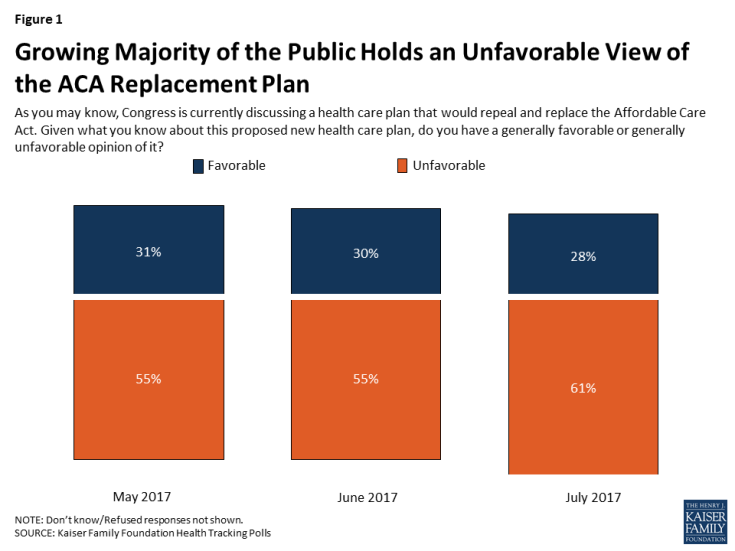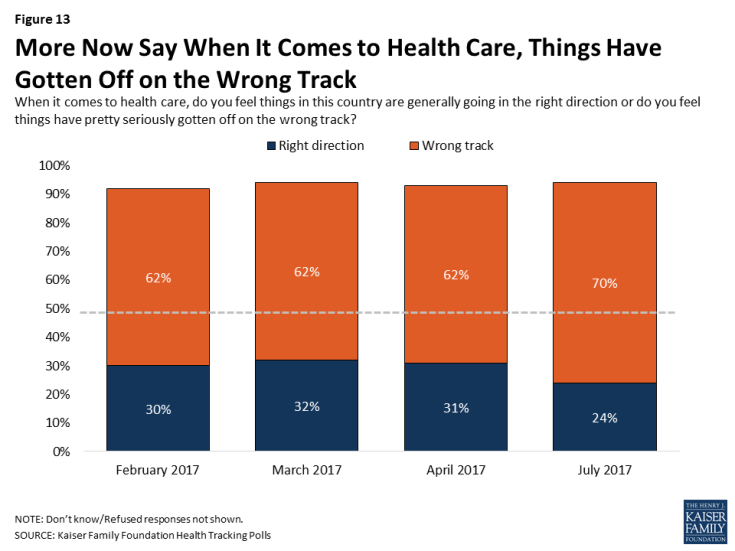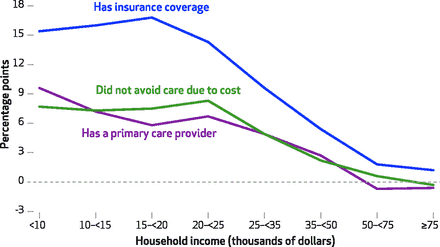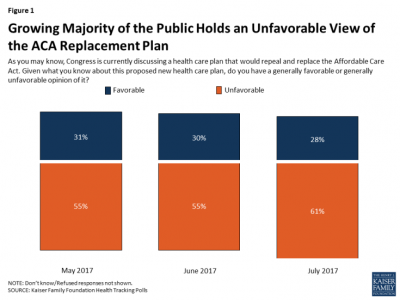
61% of Americans hold negative views of repealing-and-replacing the Affordable Care Act, according to the July 2017 Health Tracking Poll from the Kaiser Family Foundation. This month’s survey focused on Americans’ views on Republican legislative efforts to repeal and replace the Affordable Care Act (ACA). As of the writing of this post, the majority of the Senate rejected the full repeal of the ACA, but the situation is very fluid.
Note that this poll was conducted by phone between July 5-10, 2017, among 1,183 U.S. adults ages 18 and older.
The column chart here illustrates that the proportion of people who feel unfavorable about the ACA replacement plan grew 6 percentage points, form 55% to 61%, over one month from June to July 2017.
Another sign that the majority of Americans do not seek the wholesale rejection of the ACA is that two-thirds of the public opposes major reductions in Federal funding for Medicaid.
The vast majority of Americans, 71%, would prefer that Republicans in Congress collaborate with Democrats to improve the ACA and not repeal it: this statistic includes 91% of Democrats who seek cross-the-aisle work on the law, 72% of Independents, and 41% of Republicans.
There’s an important “partisan intensity gap” KFF found when it comes to the proportion of people favorable to keeping the Affordable Care Act (50%) versus the percent of people favoring repeal-and-replace of the ACA (28%).

The second chart gauges Americans’ views on whether health care is going “in the right direction” in the U.S. or gotten off on the “wrong track.” By July 2017, 70% of people said health care is on the wrong track, up 8 percentage points since February. During that period, see that fewer people believe health care is going in the right direction (down from 31% to 24% in the two months from April to July).
Health Populi’s Hot Points: There’s an informative study in the June 2017 issue of Health Affairs, devoted to health equity, on Americans’ perceptions of healthcare quality compared with health citizens living in other countries. [I covered that research in-depth here in Health Populi last month].

In the health care debate in Congress, such as it is, there’s one crucial outcome that’s not been given much airtime by anyone on Capitol Hill on either side of the aisle. That’s the fact that the Affordable Care Act significantly reduced socioeconomic disparities in health care access. The evidence for this ROI on the ACA was published this week in a web-first article in Health Affairs by a team from Boston University. The line graph illustrates that poorer people (with income categories shown on the x-axis) benefited from the ACA between 2013 and 2015 via greater insurance coverage, access to primary care providers, and less self-rationing of health care due to cost.
These three metrics are part of the argument and ROI on the ACA “working.” The KFF July 2017 poll finds that most Americans want to see Congress make improvements on this law, from which millions of fellow health citizens have benefited.





 Interviewed live on BNN Bloomberg (Canada) on the market for GLP-1 drugs for weight loss and their impact on both the health care system and consumer goods and services -- notably, food, nutrition, retail health, gyms, and other sectors.
Interviewed live on BNN Bloomberg (Canada) on the market for GLP-1 drugs for weight loss and their impact on both the health care system and consumer goods and services -- notably, food, nutrition, retail health, gyms, and other sectors. Thank you, Feedspot, for
Thank you, Feedspot, for  As you may know, I have been splitting work- and living-time between the U.S. and the E.U., most recently living in and working from Brussels. In the month of September 2024, I'll be splitting time between London and other parts of the U.K., and Italy where I'll be working with clients on consumer health, self-care and home care focused on food-as-medicine, digital health, business and scenario planning for the future...
As you may know, I have been splitting work- and living-time between the U.S. and the E.U., most recently living in and working from Brussels. In the month of September 2024, I'll be splitting time between London and other parts of the U.K., and Italy where I'll be working with clients on consumer health, self-care and home care focused on food-as-medicine, digital health, business and scenario planning for the future...